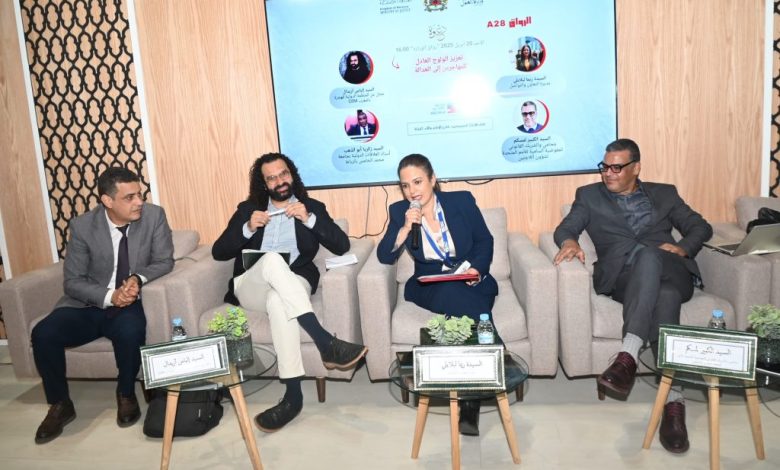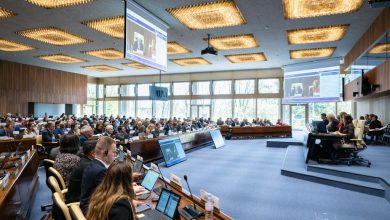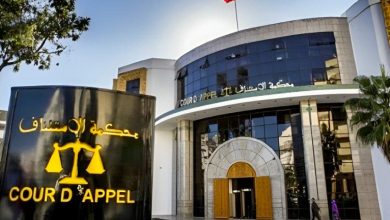The stand of the Ministry of Justice at the International Book Fair organizes a scientific seminar entitled “Promote fair access to justice for migrants”.

This article was automatically translated from HIBAPRESS, the Arabic version:
Hibapress-Rabat-MJ
On Sunday April 20, 2025, the Ministry of Justice organized on its stand at the 30th edition of the International Salon of Edition and the Book A communication meeting on the theme “Promote fair access to justice for migrants”. Hosted by Ms. Rima Leblaili, Director of Cooperation and Communication at the Ministry of Justice, Mr. Elias Aridal, representative of the International Organization for Migration (OIM) in Morocco, and Mr. Kabir Lamskem, lawyer and legal partner of the United Nations High Commissioner for Refugees (HCR), the meeting was moderated by Mr. Mostafa From bilateral cooperation to the Department of Cooperation and Communication at the Ministry of Justice, and saw the participation of a large audience interested in in -depth discussions on matters of migration and justice.
The session was launched by Ms. Rima Leblaili, Director of Cooperation and Communication, who made a complete presentation of the main historical, legislative, legal and structural stages linked to the theme of migration and asylum, supporting its speech by precise statistics showing the doubling of the number of migrants and refugees in the world, because of the wars and conflicts that contemporary. She also highlighted the challenges, risks and constraints that this group is confronted, insisting on the characteristics specific to each sex
Since the adoption of the national strategy for migration and asylum in 2013, on the recommendation of the National Council for Human Rights, Morocco has seriously involved in strengthening its legal arsenal by ratifying and signing a certain number of international conventions, such as the Palermo Convention and the International Convention on the Protection of the Rights of all Migrant Workers and members of their family, in addition The law against human trafficking and the law against violence against women, in order to strengthen intervention mechanisms and facilitate fair access to justice, said Leblaili. She stressed that the Ministry of Justice, through the establishment of intervention units at the level of the Kingdom courts and its various efforts at the legislative level, confirms its institution position guaranteeing rights.
For his part, the OIM representative, Elias Aridal, praised the active role played by the Ministry of Justice in improving access to justice for migrants and refugees and the resolution of their legal status, noting that the inclusion of this theme in the ministry’s exposure program is tangible proof of the seriousness of this commitment. He also appreciated joint programs with the justice sector, in particular those related to the training of judges, social workers, judicial assistants, translators and lawyers, in response to the obstacles encountered by migrants and asylum seekers, such as linguistic difficulties, administrative and judicial procedures, as well as their fear of accessing administrative and judicial facilities their status. For his part, Mr. Kabir Lamskem, lawyer and legal partner of the United Nations High Commissioner for Refugees (UNHCR), presented an in-depth intervention on the national legal arsenal and the corresponding procedural challenges to guarantee the rights of this category, emphasizing certain questions, such as the brevity of the appeal deadlines against administrative decisions, that the appeal does not suspend the execution in cases of deportation, expulsion, refusal or withdrawal of residence permit, as well as the absence of detention centers provided for by law, in addition to the absence of detention centers provided for by law.
The symposium experienced significant interaction on the part of the audience, which praised the subject, of the scientific level of speakers and their scientific competence, appreciating by their interventions the involvement of the Ministry of Justice and the Judicial Administration in the activation of the voluntary return of unaccompanied children, as well as positive developments in the family code, which took into account the situation of refugees requirements.
In her closing speech, Ms. Leblaili insisted on the need to review the law on asylum by adopting a holistic approach which integrates the humanitarian dimension and human rights, recalling that “migrations are not figures, but faces and dreams, and asylum is not a burden, but an opportunity for intangible investment, rehabilitation and respect for human beings and of their humanity, “she said, stressing the need to reconsider the asylum law, by adopting a holistic approach that integrates humanitarian dimension and human rights.







